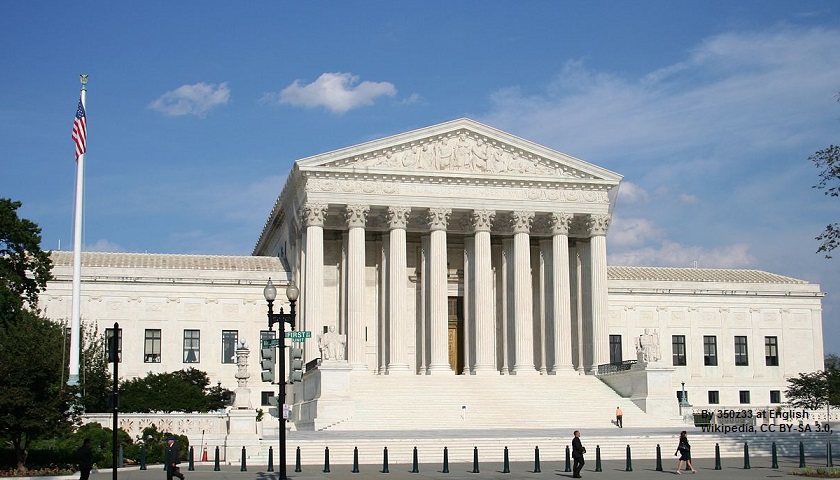by George Rasley, ConservativeHQ Editor
February 6, 2017
Reprinted with Permission from ConservativeHQ.com
On February 3, 2017 Federal District Judge James L. Robart issued a temporary restraining order barring the federal executive branch from implementing President Trump’s Executive Order temporarily barring travel from seven terrorist hotspots.
The basis for Judge Robart’s order was not the national security of the United States or the proven threat of terrorism immigration from these countries; it was that the plaintiff state (Washington) would be irreparably harmed because, “The Executive Order adversely affects the States’ residents in areas of employment, James L. Robarteducation, business, family relations, and freedom to travel… In addition, the States themselves are harmed by virtue of the damage implementation of the Executive Order has inflicted upon the operations and missions of their public universities and other institutions of higher learning, as well as injury to the States’ operations, tax bases, and public funds.”
You can read the order here.
What this means is that Judge Robart has usurped the Article 1 constitutional powers of Congress to regulate commerce with foreign countries and set the rules of naturalization and immigration, and the President’s Article 2 powers as Commander in Chief and the sole officer responsible for interaction with foreign powers.
What is worse, the Judge’s order in essence, establishes by judicial fiat a new law that, once granted a visa, a foreigner has an irrevocable right to enter the United States. This action is not only dangerous to the national security of the United States and the safety of millions of its lawful citizens, it is unconstitutional because the Constitution has clearly delegated those powers to Congress and the President.
As our friend, former Assistant U.S. Attorney Andrew C. McCarthy, pointed out in his article “Trump’s Exclusion of Aliens from Specific Countries Is Legal,” under the Constitution, as Thomas Jefferson wrote shortly after its adoption, “the transaction of business with foreign nations is Executive altogether. It belongs then to the head of that department, except as to such portions of it as are specifically submitted to the Senate. Exceptions are to be construed strictly.”
McCarthy also knocked-down claims that President Trump’s Executive Order violates the 1965 immigration act that “banned all discrimination against immigrants on the basis of national origin.”
It is true, noted McCarthy, that a section of that act, now codified in Section 1152(a) of Title 8, U.S. Code, states that (with exceptions not here relevant) “no person shall receive any preference or priority or be discriminated against in the issuance of an immigrant visa because of the person’s race, sex, nationality, place of birth, or place of residence.”
However, federal immigration law, observes McCarthy, also includes Section 1182(f), which states: “Whenever the President finds that the entry of any aliens or of any class of aliens into the United States would be detrimental to the interests of the United States, he may by proclamation, and for such period as he shall deem necessary, suspend the entry of all aliens or any class of aliens as immigrants or nonimmigrants, or impose on the entry of aliens any restrictions he may deem to be appropriate” (emphasis added).
Section 1182(f) plainly and sweepingly authorizes the president to issue temporary bans on the entry of classes of aliens for national-security purposes. This is precisely what President Trump has done. In fact, in doing so, he expressly cites Section 1182(f), and his executive order tracks the language of the statute (finding the entry of aliens from these countries at this time “would be detrimental to the interests of the United States”).
Judge Robart also ignored Supreme Court precedent from United States v. Curtiss-Wright (1936), a case that famously described “the very delicate, plenary and exclusive power of the President as the sole organ of the federal government in the field of international relations – a power which does not require as a basis for its exercise an act of Congress.”
The Curtiss-Wright case is notable in its lengthy review and findings regarding the sovereignty of the United States and the power of the federal government as the exclusive actor in the realm of foreign relations, but for the purposes of brevity I will excerpt only two sections:
The states were not ‘sovereigns’ in the sense contended for by some. They did not possess the peculiar features of sovereignty,-they could not make war, nor peace, nor alliances, nor treaties. Considering them as political beings, they were dumb, for they could not speak to any foreign sovereign whatever. They were deaf, for they could not hear any propositions from such sovereign. They had not even the organs or faculties of defence or offence, for they could not of themselves raise troops, or equip vessels, for war.’ 5 Elliot’s Debates, 212.1 [299 U.S. 304, 318] It results that the investment of the federal government with the powers of external sovereignty did not depend upon the affirmative grants of the Constitution. The powers to declare and wage war, to conclude peace, to make treaties, to maintain diplomatic relations with other sovereignties, if they had never been mentioned in the Constitution, would have vested in the federal government as necessary concomitants of nationality…
As a member of the family of nations, the right and power of the United States in that field are equal to the right and power of the other members of the international family. Otherwise, the United States is not completely sovereign. The power to acquire territory by discovery and occupation ( Jones v. United States, 137 U.S. 202, 212 , 11 S.Ct. 80), the power to expel undesirable aliens (Fong Yue Ting v. United States, 149 U.S. 698 , 705 et seq., 13 S.Ct. 1016), the power to make such international agreements as do not constitute treaties in the constitutional sense (Altman & Co. v. United States, 224 U.S. 583, 600 , 601 S., 32 S.Ct. 593; Crandall, Treaties, Their Making and Enforcement (2d Ed.) p. 102 and note 1), none of which is expressly affirmed by the Constitution, nevertheless exist as inherently inseparable from the conception of nationality. This the court recognized, and in each of the cases cited found the warrant for its conclusions not in the provisions of the Constitution, but in the law of nations.
In Curtiss-Wright the Court further found:
As Marshall said in his great argument of March 7, 1800, in the House of Representatives, ‘The President is the sole organ of the nation in its external relations, and its sole representative with foreign nations.’ Annals, 6th Cong., col. 613. The Senate Committee on Foreign Relations at a very early day in our history ( February 15, 1816), reported to the Senate, among other things, as follows:
‘The President is the constitutional representative of the United States with regard to foreign nations. He manages our concerns with foreign nations and must necessarily be most competent to determine when, how, and upon what subjects negotiation may be urged with the greatest prospect of success. For his conduct he is responsible to the Constitution. The committee considers this responsibility the surest pledge for the faithful discharge of his duty. They think the interference of the Senate in the direction of foreign negotiations calculated to diminish that responsibility and thereby to impair the best security for the national safety. The nature of transactions with foreign nations, moreover, requires caution and unity of design, and their success frequently depends on secrecy and dispatch.’ 8 U.S.Sen.Reports Comm. on Foreign Relations, p. 24.
It is important to bear in mind that we are here dealing not alone with an authority vested in the President by an [299 U.S. 304, 320] exertion of legislative power, but with such an authority plus the very delicate, plenary and exclusive power of the President as the sole organ of the federal government in the field of international relations-a power which does not require as a basis for its exercise an act of Congress, but which, of course, like every other governmental power, must be exercised in subordination to the applicable provisions of the Constitution. It is quite apparent that if, in the maintenance of our international relations, embarrassment-perhaps serious embarrassment-is to be avoided and success for our aims achieved, congressional legislation which is to be made effective through negotiation and inquiry within the international field must often accord to the President a degree of discretion and freedom from statutory restriction which would not be admissible were domestic affairs alone involved. Moreover, he, not Congress, has the better opportunity of knowing the conditions which prevail in foreign countries, and especially is this true in time of war. He has his confidential sources of information. He has his agents in the form of diplomatic, consular and other officials. Secrecy in respect of information gathered by them may be highly necessary, and the premature disclosure of it productive of harmful results.
Clearly Judge Robart has ignored both the Constitution, the plain language of the laws passed by Congress and the Supreme Court precedent in the Curtiss-Wright case to issue a temporary restraining order based on his own political views.
The Constitution says, in Article Three, that “The judicial Power of the United States, shall be vested in one supreme Court, and in such inferior Courts as the Congress may from time to time ordain and establish. The Judges, both of the supreme and inferior Courts, shall hold their Offices during good Behaviour…”
What constitutes “good behavior” has been an issue since the very dawn of the Republic, particularly when federal judges intervene in political and policy matters that are properly the constitutional powers of the other two branches of government.
In 1804, eight articles of impeachment were filed against Associate Justice of the Supreme Court Samuel Chase, who was appointed to the bench by President George Washington. The articles of impeachment accused him of allowing his political views to interfere with his decisions. This description of events comes from the U.S. Senate’s website:
The House voted to impeach Chase on March 12, 1804, accusing Chase of refusing to dismiss biased jurors and of excluding or limiting defense witnesses in two politically sensitive cases. The trial managers (members of the House of Representatives) hoped to prove that Chase had “behaved in an arbitrary, oppressive, and unjust way by announcing his legal interpretation on the law of treason before defense counsel had been heard.” Highlighting the political nature of this case, the final article of impeachment accused the justice of continually promoting his political agenda on the bench, thereby “tending to prostitute the high judicial character with which he was invested, to the low purpose of an electioneering partizan.”
A majority of the Senate voted guilty on three of the eight articles, but on each article the vote fell short of the two-thirds required for conviction and Associate Justice Chase returned to the bench until his death.
The conduct of Federal District Judge James L. Robart in the matter of President Trump’s Executive Orders pausing immigration from terrorist hotspots is every bit as egregious as that of Associate Justice Chase, and certainly more dangerous to the public safety and constitutional order of the Republic.
We urge the House of Representatives to immediately prepare articles of impeachment against Judge Robart and to hold hearings at the earliest possible hour. Even though Senate Democrats may deny the two-thirds vote necessary to remove Robart from the bench, the public needs to know exactly how his blatant partisanship and anti-constitutional behavior has jeopardized our national security and intruded upon the clear constitutional prerogatives of the Congress and the President.
The Capitol Switchboard is (1-866-220-0044) we urge you to call your Representative and demand the immediate impeachment of Judge Robart.





